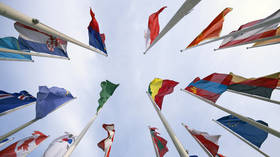
One country can’t dictate terms to the rest of the world, the vice chairman of the Shanghai Center for Intl Studies says

© Getty Images / querbeet
The so-called ‘rules-based order,’ often spoken about in the West as the governing principle of global relations, is not something that actually has a clear definition, Nelson Wong, the vice chairman of the Shanghai Center for International Studies, has said.
Speaking to RT on Sunday, Wong noted that the provisions of this ‘rules-based order’ are “nowhere to be found,” as they are not written out in any sort of document.
He stressed, however, that it was crucial that nations moving into the “new phase of world development” need to “play by the rules,” which should be spelled out and agreed to by all major players, and not just one country.
Wong commented on recent statements made by the leaders of China and Russia about an emerging “multi-polar world,” noting that it is “definitely on its way” and expressed hope that the West will “face the reality.”
As China continues with its multi-trillion-dollar initiative known as One Belt One Road, which aims to develop global infrastructure through investments in nearly 150 countries and international organizations, Wong says Beijing has chosen “a different route” for global expansion, in contrast to the colonial practices of the West.
The expert also weighed in on Xi Jinping being elected to a third term as general secretary of China’s Communist Party, stating that the unprecedented appointment shows the “unity and consensus of the party.”
Responding to claims made by Western media outlets that Xi was trying to bolster loyalty to himself by reshuffling his cabinet, Wong insisted that such perceptions are “very wrong” and shows that those making such accusations “don’t understand Chinese politics.”
The same “ridiculous perceptions of China” also explain the West’s concerns that Beijing plans to take back the self-governing island of Taiwan by force, Wong noted. He reiterated China’s position that it seeks “national reunification” with the island through peaceful means and diplomacy and that the use of force is only reserved for when a foreign country interferes in the issue or when Taiwanese separatist groups “go out of control.”




